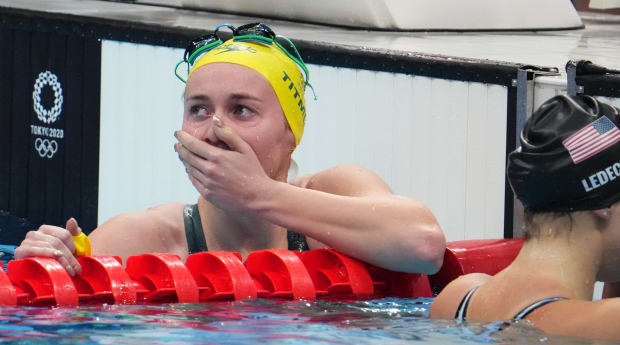After the 20-year-old Australian defeated Katie Ledecky in the 400-meter freestyle to capture the gold medal, her coach erupted with a wild celebration.
TOKYO — For the usher at the Tokyo Aquatics Center who found herself trying to contain coach Dean Boxall Monday morning, Swimming Australia has a message: Sorry about that.
“I’d like to give her a T-shirt,” says media director Kate Hutchison.
Perhaps paying for some counseling would be nice, too. The orderly, rules-obsessed folks working at the venues during these Olympics ran up against the world’s wildest swim coach at just the right/wrong time, depending on your viewpoint. Boxall’s star swimmer, Ariarne Titmus, had just
defeated Olympic freestyle queen Katie Ledecky for a gold medal in the best 400-meter freestyle in history, and what happened next went viral very quickly:The 43-year-old Boxall, who exudes a Jeff Spicoli-meets-Matthew McConaughey-meets-unhinged-nose-tackle vibe, “lost it,” in his own words. “I think I went outside of my body,” he told a small group of reporters a few hours after the race Monday. “I just lost it.” He went outside of his body and out of bounds per the dictates of the arena, to the alarm of the usher he was standing near him as the race concluded. Off went the mask. Up went the punches into the air. Around a barrier he went. And then there were the pelvic thrusts while grabbing a railing and howling in exultation.
This was some WWE stuff, and as it turns out Boxall was a childhood fan of The Ultimate Warrior. This eruption was also fairly standard operating procedure. Boxall put on a similar show in June when his swimmer Elijah Winnington won the men’s 400-meter freestyle at Australian Olympic Trials, with Boxall bellowing into a camera: “The animal!”
In terms of coaches processing epic sporting moments, this was pretty much the opposite end of the spectrum from Villanova basketball coach Jay Wright mouthing “bang” after winning the NCAA tournament on a last-second shot. Plenty of people were ready to flag Boxall for excessive celebration—grandstanding, look-at-me-histrionics, whatever you want to call it—but plenty more enjoyed seeing a coach thrilled out of his mind for his swimmer.
“Americans might not like it, I don’t know,” Boxall says. “But they jump around as much as me. But I can’t help it. believe in my athletes. It’s very simple, when the athletes leave the pool deck … they begin the recovery process and they switch off. I go home and try to find a way for them to get better. I don’t turn it off. That’s probably why I let it out.”
In Australian nomenclature, Boxall is “a bit loose.” A bit out there. But he has a charisma that allows him to relate to swimmers, media and others who know him beyond the post-race eruptions. “He’s the kind of guy you can sit down and talk about your life for an hour over a cup of coffee,” says Phil Lutton of the Sydney Morning Herald. “He’s not for everyone, but he’s very involved with his athletes.”
Anyone tempted to tell Boxall to act like he’s been here before should know that he hasn’t been here before. His star is on the rise, although there are critics of his coaching methods.
The 20-year-old Titmus, whose emotions tend to run much cooler than her coach’s, stuck up for Boxall, saying he “means everything to me.” And whatever you may think of his decorum, the rising star in Australian coaching is getting results. His investment in Titmus has brought her alongside the greatest female freestyler in history, and it triggered the outpouring after the race.
“That’s a moment of being with this girl five years and having a dream together,” Boxall says. “Katie [Ledecky] was so far ahead of her when I started working with her, we couldn’t even have the conversation [about competing with her]. Katie was an outlier.”
Boxall says he “dug in his heels,” and Titmus began “chipping away” at what was a gap of 16 seconds between Titmus’s best in the 400 and Ledecky’s. By 2019, the gap had closed to the point that Titmus intruded on Ledecky’s sub-4-minute turf. And by this summer, Titmus became the only other woman to break 3:57.

Coming here, Titmus was now the favorite and Ledecky the challenger. But when Ledecky put together a stout first 200 meters that opened up nearly a body-length lead, Titmus had to retain her composure and stick to her gameplan.
“She executed the race plan to perfection,” Boxall says. “That was an incredibly high-pressure situation and she executed. … Katie looked awesome—she was aggressive, looked like the old Katie. And ‘Arnie’ stuck to the game plan and what I asked her to do started to come to fruition, I said, ‘Here we go.’ It became the dogfight we thought it was going to be.”
For all the praise Boxall has garnered for Titmus’s triumph, he’s also had to answer for Winnington’s disappointing Olympic performance. The top seed in the 400 finished seventh in that race. “He wanted it so much, I think he got a little bit tense,” Boxall says. “He’s a beautiful kid. He’ll get up on this [800] really and give it a shot.”
Ledecky and Titmus will meet three more times here, in the 200- and 1,500-meter freestyles and the 800-meter relay. So get used to seeing Dean Boxall theatrics on your TV screen. He seems to be able to find the cameras.
More Olympics Coverage:
No comments:
Post a Comment